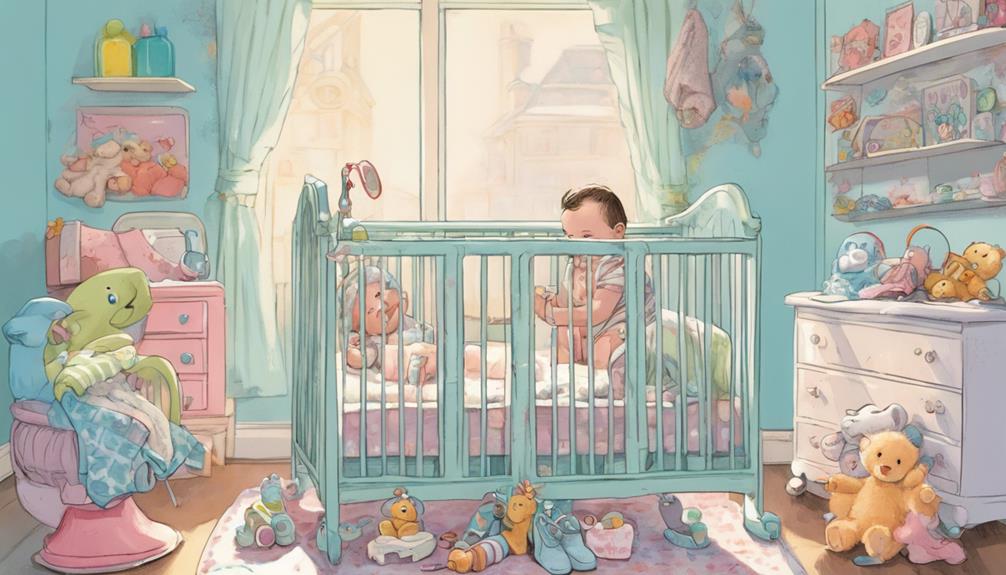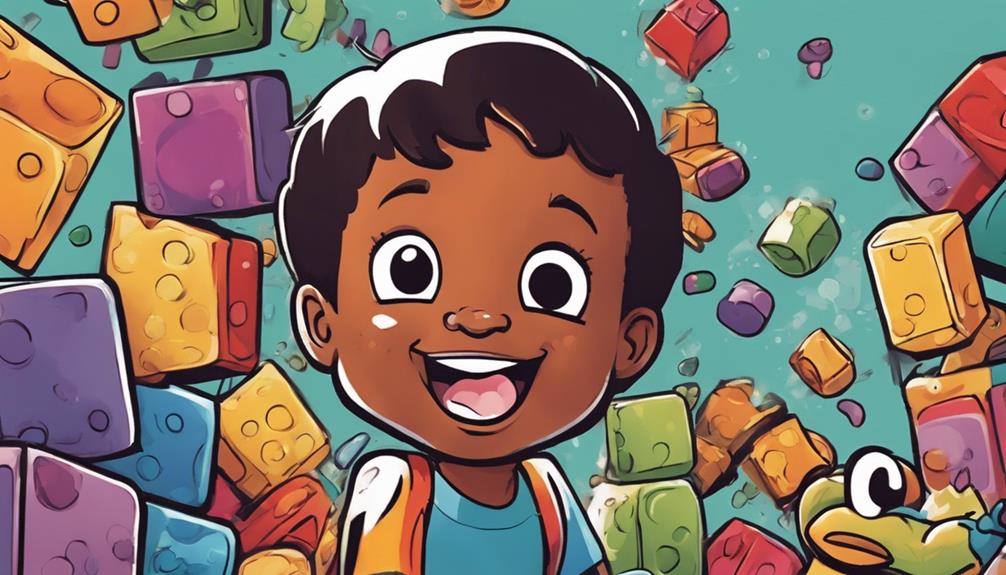You should start brushing your baby's teeth as soon as the first tooth appears, usually around six months old. Use a small-headed, soft-bristled toothbrush and a rice-sized amount of fluoride toothpaste. Aim to brush twice a day, once in the morning and once before bedtime. It's important to supervise their brushing until they're about seven or eight years old. This early routine not only promotes good oral health but also lays the foundation for positive dental habits. There's a lot more to explore about creating a fun brushing routine and scheduling dental visits that can support your child's smile.
Key Takeaways
- Start brushing as soon as the first tooth appears, usually around six months of age.
- Use a small-headed, soft-bristled toothbrush with a rice-sized amount of fluoride toothpaste.
- Brush twice daily, ideally in the morning and before bedtime.
- Supervise brushing until the child is about seven or eight years old.
Importance of Early Dental Care
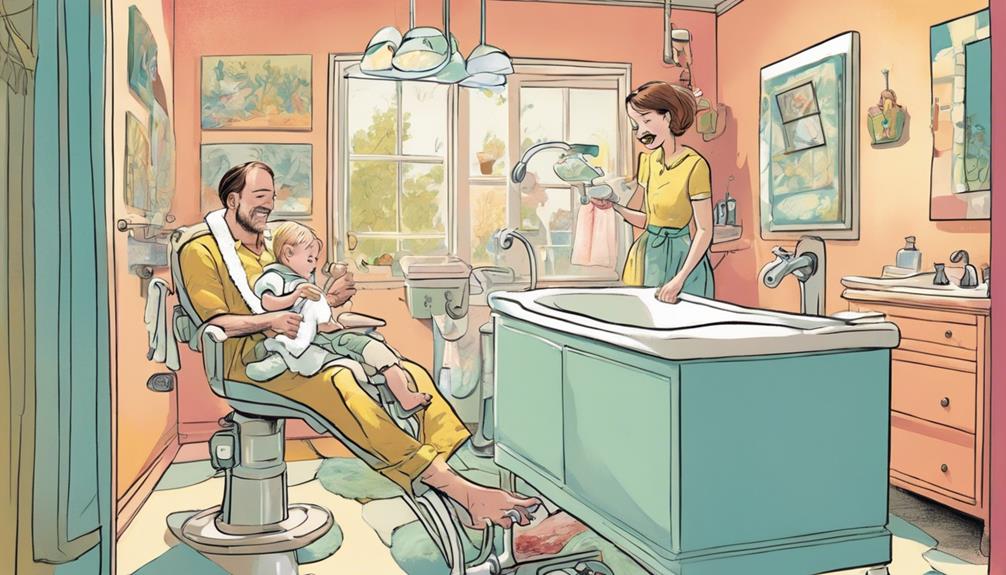
Starting dental care early is essential for establishing healthy habits that protect your child's smile for a lifetime.
As soon as that first tooth emerges, typically around six months, you should begin an oral health routine. Cleaning your baby's gums daily, even before they've teeth, helps remove decay-causing bacteria and prepares them for future brushing. This early intervention is critical; it greatly reduces the risk of dental caries and promotes healthy gums and oral tissues.
Baby teeth may be temporary, but they play an important role in your child's ability to eat, speak, and guide the development of adult teeth.
Establishing a positive attitude towards dental care during infancy sets the foundation for regular dental visits and lifelong dental health.
When to Start Brushing
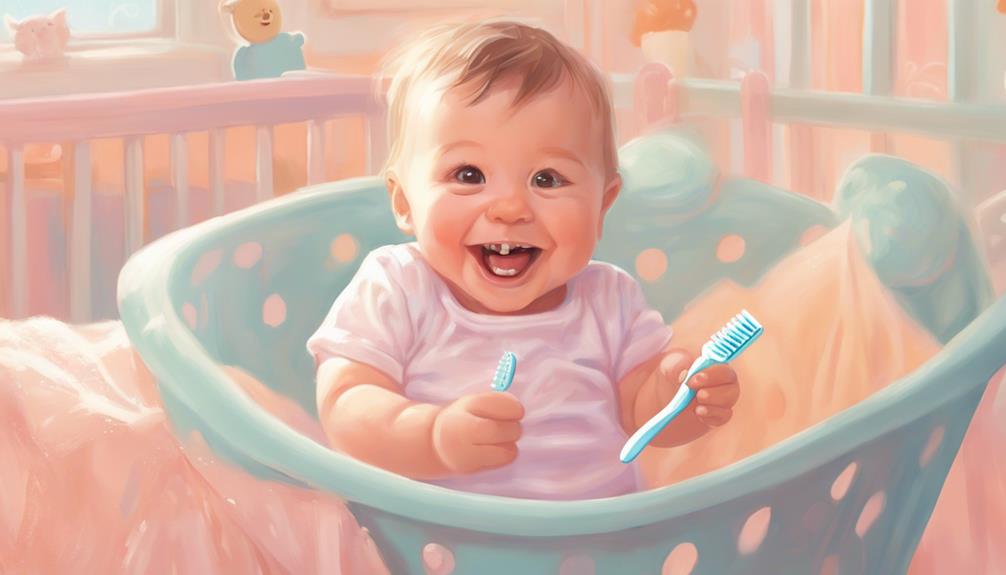
You should start brushing your baby's teeth as soon as that first tooth pops up, usually around six months. It’s important to use a small, soft-bristled toothbrush and water at first, and then introduce a tiny amount of fluoride toothpaste as your child grows. Make sure to brush your baby’s teeth twice a day, once in the morning and once before bed. For more baby teeth brushing tips, consult with your child’s pediatrician or a pediatric dentist for guidance on proper techniques and age-appropriate oral care products.
Establishing this early routine helps prevent plaque buildup and sets the stage for lifelong oral health.
First Tooth Eruption
As soon as that first tiny tooth breaks through around six months, it's important to begin brushing. You should start brushing your baby's teeth with a small-headed, soft-bristled toothbrush. Use just a grain-of-rice-sized amount of fluoride toothpaste for children under three years old. To promote good oral care, aim to brush twice a day—ideally in the morning and right before bedtime. This helps remove plaque and supports healthy dental development.
While cleaning your baby's gums before teeth erupt is important, once the first tooth appears, you need to focus on brushing. It's vital to supervise your little one until they're about seven or eight years old, so they can learn the proper brushing technique and don't end up swallowing toothpaste.
Incorporating brushing into your daily routine will make it easier for them to adapt. Don't forget to schedule your baby's first dental appointment around their first birthday. This visit is significant for monitoring oral health and establishing a long-term dental care routine.
Starting these habits early sets the foundation for a lifetime of healthy teeth.
Establishing Early Routine
It's crucial to establish an early brushing routine to guarantee your baby's dental health from the very first tooth. You can start cleaning your baby's gums with a clean, damp washcloth or an infant toothbrush just a few days after birth. This practice helps to establish a routine that sets the foundation for good oral hygiene.
Once your baby's first tooth erupts, typically around six months, it's time to start brushing your baby's teeth. Use a small smear of fluoride toothpaste to keep those baby teeth healthy. Remember to brush twice a day—ideally before bedtime and one other time during the day.
Here are some tips to help you along the way:
- Begin cleaning your baby's gums early on.
- Use a soft infant toothbrush for comfort.
- Shift to a rice grain-sized amount of fluoride toothpaste by age three.
- Schedule your baby's first dental appointment by their first birthday.
Choosing the Right Tools

Selecting the right toothbrush is essential for effectively cleaning an infant's delicate gums and emerging teeth. Choose a toothbrush specifically designed for infants, featuring a small head and soft bristles. This guarantees gentle cleaning without causing any discomfort. During the first 0-18 months, it's recommended to use only water for cleaning their teeth; avoid using toothpaste until the first tooth appears.
Once that first tooth erupts, you can switch to a small smear of fluoride toothpaste for infants. For children aged 3 to 6 years, a pea-sized amount of toothpaste is appropriate. This gradual shift helps build good habits as they grow.
If your child is aged 3 or older, consider using an electric toothbrush designed for children. These can make brushing more enjoyable and effective.
Don't forget to regularly replace your child's toothbrush every 2-4 months or sooner if the bristles become frayed. This guarantees ideal cleaning performance and supports their dental health.
Effective Brushing Techniques

When you brush your baby's teeth, it's crucial to use the right techniques for effective cleaning.
Supervision is key until your child is about eight, ensuring they develop proper brushing habits.
Supervision Until Age Eight
Adult supervision plays an essential role in helping kids develop effective brushing techniques until they reach around eight years old.
As you start brushing your baby's teeth, it's vital to position them comfortably, perhaps sitting on your lap facing away from you. This makes it easier to reach all areas of their mouth.
While brushing your child's teeth, aim for about two minutes using gentle circular motions. Focus on all surfaces of the teeth and the gum line.
Here are some tips to guarantee effective brushing:
- Encourage your child to reach all areas, including the back teeth.
- Avoid rinsing with water after brushing to maintain fluoride protection.
- Regularly check and assist with brushing until they can demonstrate effective skills.
- Make it a fun routine to help prevent tooth decay.
Proper Brushing Techniques
To guarantee your baby's teeth are properly cleaned, start brushing as soon as the first tooth appears, using gentle circular motions with a soft-bristled toothbrush.
Use a soft rubber toothbrush designed for infants, and brush twice daily for about two minutes. Focus on making small circles at a 45-degree angle to effectively clean all teeth surfaces.
When brushing your child's teeth, use a grain-of-rice-sized amount of fluoride toothpaste for those under three years old. For kids aged three to six, switch to a pea-sized amount. It's crucial to supervise brushing until your child is at least seven to confirm they're brushing thoroughly and correctly.
After brushing, encourage your child to spit out the toothpaste instead of rinsing with water. This helps maintain the fluoride protection their teeth need.
If your baby has trouble with brushing, gently wipe their gums and teeth with a damp cloth until they're ready for a toothbrush.
Encouraging Independence in Brushing
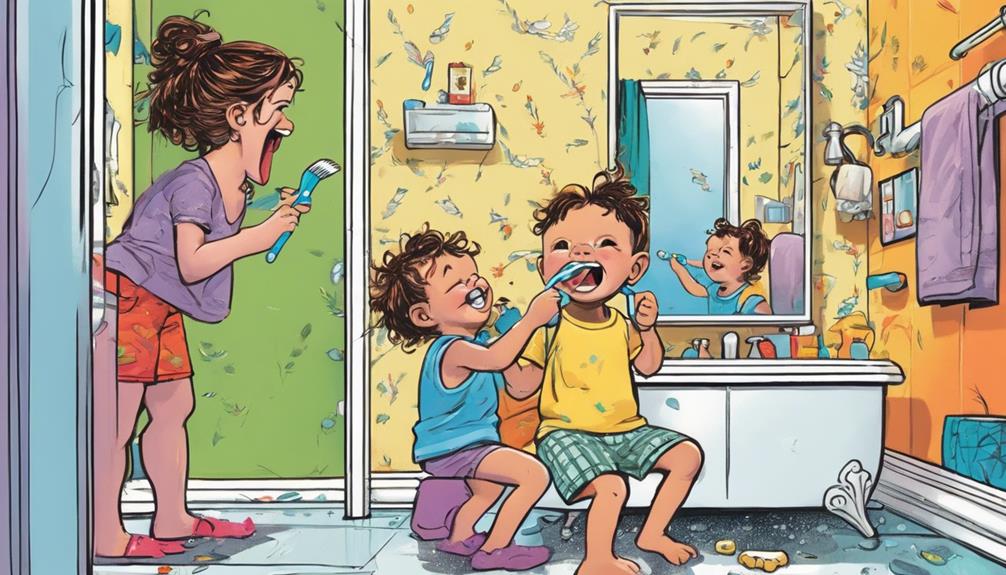
Encouraging toddlers to take charge of their own brushing routine fosters independence and builds essential dental skills early on. You should start brushing your child's teeth as soon as they erupt, but by ages 2-3, let them attempt brushing first. This helps develop their skills while you supervise until children can brush effectively, usually by age 7 or 8.
To make this process enjoyable, consider the following tips:
- Use fun tools, like colorful toothbrushes, to engage your child.
- Choose enjoyable toothpaste flavors to make brushing more appealing.
- Implement timers or play two-minute songs during brushing sessions to keep the routine fun.
- Create a positive environment, celebrating successes to reinforce the habit.
Professional Dental Recommendations
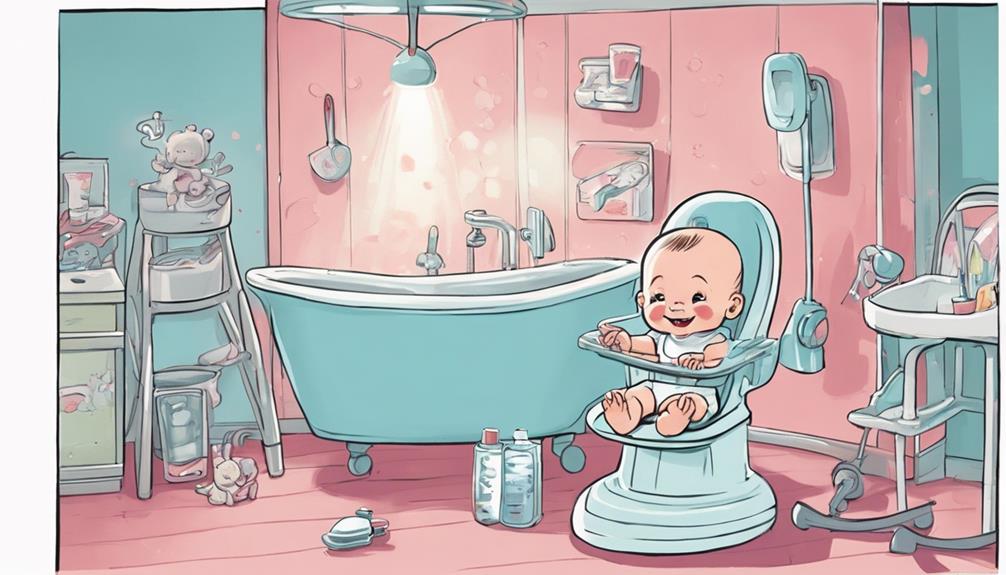
Starting a dental care routine early is critical, so as soon as your baby's first tooth appears, it's time to brush. The American Academy of Pediatric Dentistry recommends using a small-headed, soft-bristled toothbrush with a rice grain-sized smear of fluoride toothpaste. Once your child turns three, you can increase the amount to a pea-sized amount. This daily routine will help establish good habits early on.
It's important to supervise your child while brushing until they're at least seven or eight years old. This guarantees they're cleaning effectively and using proper technique.
Don't forget to schedule the first dental visit by age one or within six months of that first tooth eruption. This visit is essential to monitor your baby's oral health and set a foundation for future care.
Regular dental check-ups every six months are also recommended. These visits help prevent dental issues and promote lifelong healthy habits.
Frequently Asked Questions
When Should I Brush My Baby's First Teeth?
You should start brushing your baby's first teeth as soon as they appear. Use a soft-bristled toothbrush and a tiny smear of fluoride toothpaste, brushing gently twice a day to promote healthy oral hygiene habits.
When Should I Brush My Newborn's Mouth?
Think of your newborn's mouth as a precious garden. You should gently clean it with a damp washcloth or gauze from day one, establishing a nurturing routine that prevents decay and promotes healthy growth.
Do Babies Need Toothpaste?
Yes, babies need toothpaste once their first tooth appears. Before that, just use water. When introducing fluoride toothpaste, start with a tiny smear to effectively clean and prevent cavities as they grow.
Is It OK Not to Brush Baby Teeth?
It might seem harmless to skip brushing baby teeth, but that choice can lead to plaque buildup and cavities. You're setting the stage for strong dental habits, so don't overlook this vital step in oral care.
What Age Should I Start Brushing My Baby’s Teeth?
It’s recommended to start a brushing babies teeth schedule as soon as the first tooth emerges, typically around 6 months old. Use a soft toothbrush and water or a small amount of fluoride toothpaste. As more teeth come in, gradually increase the amount of toothpaste and start flossing.
Conclusion
Starting your baby's dental care journey early sets the stage for a lifetime of healthy smiles.
By brushing as soon as their first tooth appears, you're not just cleaning teeth; you're building a foundation of good habits.
With the right tools and techniques, you'll make brushing a fun routine rather than a chore.
So, let your little one shine like a star by encouraging their independence—because every great smile deserves to sparkle!
